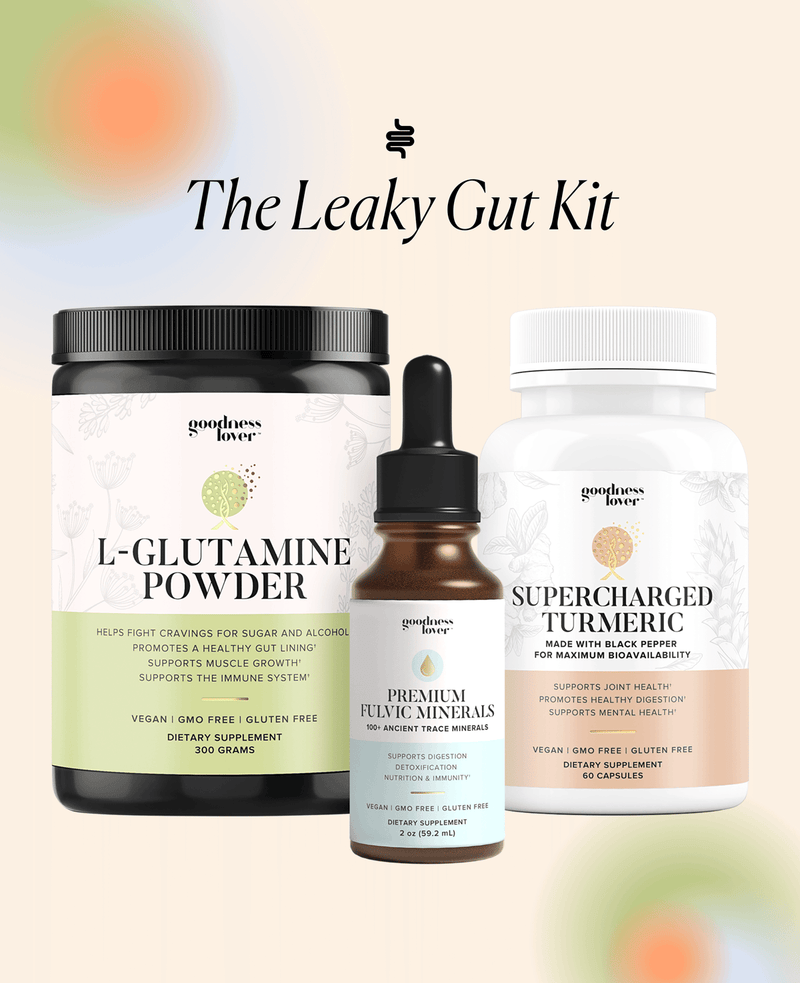In the realm of digestive health, you might have heard whispers of the enigmatic "leaky gut syndrome." While it may sound like a plot point in a medical thriller, it's a condition that's been gaining attention in recent years for good reason.
Leaky gut, technically known as increased intestinal permeability, isn't just some buzzword; it's a legitimate concern for many.
Research shows that leaky gut syndrome plays a role in the development or exacerbation of several health conditions. Among these are autoimmune diseases like rheumatoid arthritis and celiac disease, where the immune system mistakenly targets the body's own tissues.
Additionally, there's evidence linking leaky gut to digestive disorders such as irritable bowel syndrome (IBS) and inflammatory bowel disease (IBD). Neurological conditions like Alzheimer's and Parkinson's disease have also been explored in relation to gut health due to the gut-brain connection.
It's becoming increasingly clear that maintaining a healthy gut may be a critical aspect of preventing and managing a range of diseases.
Table Of Contents:
What Exactly Is Leaky Gut?
Leaky gut, technically known as intestinal hyperpermeability, is essentially where your intestinal lining is porous. This intestinal lining is extensive, covering more than 4,000 square feet of surface area. Along this intestinal tract, we have many microvilli, which are finger-like hairs that increase the area of absorption in our gut and help to absorb our nutrients and eliminate waste. If they get damaged, it can lead to the intestinal barrier becoming “leaky” and our intestinal lining becoming porous.
Imagine it is like a sieve that you use in cooking to separate the liquid and smaller particles from the larger ones. Your intestines have small “pores” like that, allowing only liquid or very small molecules to go through. If the intestinal wall is damaged and “hyperpermeable,” this allows things like waste products and toxins, food proteins, bacteria and other compounds to seep through the membranes and enter the bloodstream.
The immune system then mounts a response to what they see as foreign bodies in the bloodstream leading to inflammation, immune dysregulation and subsequent diseases.
While leaky gut can be caused by various factors, including chronic stress and certain medications, one key player is the food we consume. Yes, you read that right—your diet may be influencing whether your gut is a robust fortress or a leaky sieve.
In this article, we'll embark on a journey through the following eight foods that have been implicated in contributing to leaky gut. It's time to uncover the dietary culprits that could be undermining your gut health.
1. Dairy
Ah, dairy—often the cornerstone of many diets. Milk, cheese, yogurt; these have been our trusted companions at our main meals, and in-between snack moments. However, for some individuals, this relationship might not be as harmonious as it seems. Dairy products can potentially be a double-edged sword when it comes to gut health.
The issue largely revolves around lactose, a natural sugar found in dairy. If your body lacks the enzyme required to break down lactose, it can lead to uncomfortable digestive symptoms like bloating, gas, and diarrhea—a condition known as lactose intolerance. In fact, about three-quarters of the world’s population has some degree of lactose intolerance.
When your body can't properly digest lactose, the undigested sugar moves into the colon, where it ferments and produces gas, leading to these unwelcome symptoms. This digestive distress is not just a momentary inconvenience; it can also trigger inflammation in the gut lining. So if you are lactose intolerant and you continue consuming dairy, this is only fuelling the inflammatory fire and providing an environment ripe for leaky gut.
Some studies suggest that dairy products, particularly those derived from conventionally raised cows, may contain pro-inflammatory compounds like hormones and antibiotics. These can potentially contribute to inflammation within the body, as these substances may disrupt the delicate hormonal balance and microbiome of the gut, leading to an inflammatory response.
Also, the process of obtaining milk from a cow and transforming it into the sterile, shelf-stable product that sits on our supermarket shelves damages nutrient composition and destroys its enzymes. A lack of beneficial enzymes can make milk less digestible, potentially leading to gastrointestinal issues and inflammation.
While dairy's impact on gut health is not uniform and varies from person to person, it's essential to pay attention to your body's signals. If you suspect that dairy might be causing digestive discomfort or contributing to gut issues, exploring dairy alternatives and lactose-free options can be a helpful step in supporting your gut's well-being.
2. Gluten
For many, a meal without grains is like a day without sunshine. Bread, pasta, and cereals are dietary staples that bring comfort and familiarity to our plates. However, when we talk about grains, we often encounter a term that's become the subject of widespread dietary discussions: gluten.
Gluten, a protein found in wheat, barley, and rye, plays a crucial role in giving bread its elastic texture and holding together many baked goods. Yet, for some individuals, gluten can be a source of digestive distress and potential harm to the gut due to its potential impact on zonulin.
Zonulin is a protein that regulates the tight junctions in the gut lining, acting as gatekeepers for the passage of substances into the bloodstream. Elevated zonulin levels can weaken these gates, potentially causing leaky gut.
Studies suggest that gluten, specifically gliadin, a component of gluten, may trigger the release of zonulin in certain individuals. This has led to the hypothesis that gluten may contribute to leaky gut by influencing zonulin levels, although the exact mechanisms are still under investigation.
For some people, however, it is clear that gluten can wreak havoc on their gut barrier.
Celiac disease
At one end of the spectrum, we have celiac disease, an autoimmune condition triggered by the ingestion of gluten. In celiac disease, the immune system mistakenly attacks the lining of the small intestine in response to gluten exposure, leading to inflammation and damage to the gut. Even small amounts of gluten can trigger this response, making a strict gluten-free diet essential for those with celiac disease.
Gluten sensitivity
But what about those who don't have celiac disease yet still experience discomfort after consuming gluten? They may fall under the category of gluten sensitivity. While not as severe as celiac disease, gluten sensitivity can lead to digestive symptoms like bloating, diarrhea, and abdominal pain. Some researchers also suspect that gluten sensitivity might be connected to increased intestinal permeability, potentially contributing to leaky gut.
Should everyone avoid gluten?
The question of whether everyone should avoid gluten is a complex one. While gluten can pose issues for some individuals, it's essential to remember that it doesn't inherently harm everyone. Many people can enjoy gluten-containing grains without experiencing adverse effects on their gut permeability. It’s just good to know the harm it can do if you are one with an allergy or intolerance to the protein.
But if none of these apply to you, then avoiding gluten means you are going to be missing out on all the health benefits organic, gluten-containing whole grains have to offer. See our blog here for more information on the benefits of gluten.
If something like gluten seems suspiciously damaging on your gut, why not test it out directly? Conducting a self-experiment of going off and then reincorporating gluten into your diet will allow you to evaluate what works best for you. 
3. Processed and sugary foods
In the hustle and bustle of modern life, processed foods have come to the rescue as convenient and readily available meal options. From microwavable dinners to sweet treats that tantalize the taste buds, these products offer quick satisfaction for our cravings. Yet, beneath the allure of convenience, there's a hidden truth about the impact of processed and sugary foods on our gut health.
High refined sugar intake can disrupt the balance of gut bacteria, promoting the overgrowth of harmful microbes at the expense of beneficial ones. This microbial imbalance can contribute to inflammation, which is increasingly recognized as a major player in various health issues. The spikes and crashes in blood sugar levels that accompany sugary food consumption can also wreak havoc on the gut lining, potentially contributing to increased intestinal permeability, or leaky gut.
Another concern with processed foods is their low fiber content. Fiber is the indigestible part of plant foods that serves as a valuable fuel source for our gut bacteria. A diet lacking in fiber can starve these beneficial microbes, leading to a less diverse and potentially less healthy gut microbiome. Moreover, fiber plays a crucial role in maintaining the integrity of the gut lining.
Finally, another increasingly recognised damaging component of processed foods is a group of compounds known as advanced glycation end products (AGEs). AGEs are compounds that form when sugars react with proteins or fats without the control of an enzyme. These AGEs can accumulate in the body due to various factors, one of which is the consumption of processed foods.
Research suggests that high levels of AGEs in the body may contribute to the development of leaky gut. AGEs can induce inflammation and oxidative stress in the gut lining, which can compromise the integrity of the intestinal barrier. Additionally, AGEs can trigger the activation of certain receptors (RAGE), which are involved in inflammation and immune responses. This combination of factors can lead to increased intestinal permeability and the onset or exacerbation of leaky gut syndrome.
4. Artificial sweeteners
The impact of artificial sweeteners on gut health is a subject of ongoing debate and research. Artificial sweeteners like saccharin, aspartame, sucralose, and others are far sweeter than natural sugars, which means you can use less to achieve the same level of sweetness. While this may seem like a sweet deal for calorie-conscious individuals, the story in the gut is a bit more complex.
Emerging studies suggest that artificial sweeteners might influence the composition and function of the gut microbiome. These sugar substitutes can alter the balance of gut bacteria, favoring the growth of certain types of microbes that are associated with metabolic disturbances, inflammation and increased intestinal permeability.
Another aspect to consider is how artificial sweeteners affect our taste preferences. By providing an intensely sweet taste without the accompanying calories, they can potentially lead to a preference for sweeter foods. This shift in taste preferences may influence dietary choices, including a higher consumption of sugary or sweetened products, which can be detrimental to gut health.
5. Nightshade vegetables
While nightshade vegetables are a staple in many diets and offer an array of nutrients, for some individuals, they can be a source of concern, especially in the context of gut health and leaky gut syndrome. Nightshades, including tomatoes, peppers, eggplants, and potatoes, contain natural plant compounds known as alkaloids, and it's these alkaloids that have raised questions about their impact on the gut.
Certain alkaloids, such as solanine and capsaicin, have been associated with gut irritation in susceptible individuals. When the gut lining becomes irritated and inflamed, it can compromise its integrity, allowing for increased intestinal permeability or leaky gut.
It's essential to note that not everyone reacts negatively to nightshades. Many individuals can enjoy these vegetables without experiencing any issues. However, for those who suspect that nightshades might be contributing to digestive discomfort or worsening gut symptoms, an elimination diet or consultation with a healthcare professional may be a helpful step to pinpoint specific dietary triggers and promote gut healing.
6. Foods high in saturated fats
High-fat foods have become a hallmark of modern diets, often celebrated for their deliciousness and satiety. However, while fats are essential for various bodily functions, the types and amounts consumed can significantly influence the gut and its integrity.
Saturated and trans fats, commonly found in fried foods, processed snacks, and certain cooking oils, have been linked to gut inflammation. Chronic inflammation in the gut, as we already know can contribute to leaky gut. These fats may also alter the composition of gut bacteria, favoring the growth of harmful microbes while diminishing the presence of beneficial ones.
Excessive consumption of high-fat foods, especially saturated fats, may also disrupt the mucus layer that protects the gut. This disruption can leave the gut more vulnerable to damage from dietary toxins and harmful bacteria, further increasing the risk of leaky gut.
It's important to note that not all fats are detrimental to gut health. Healthy fats, such as those found in avocados, nuts, seeds, and olives, can actually support gut integrity and reduce inflammation. These fats provide essential nutrients and support the growth of beneficial gut bacteria.
7. Alcohol
Alcohol is notorious for its ability to irritate the gastrointestinal tract. Studies have shown that excessive alcohol consumption can cause the stomach to produce more acid than usual, slow digestion, and damage the lining of the stomach leading to leaky gut.
Alcohol doesn't just affect the physical integrity of the gut lining; it also influences the delicate balance of your gut microbiome. It can lead to an overgrowth of harmful bacteria while reducing the population of beneficial microbes.
8. Artificial food additives
While food additives are designed to improve the appeal of processed foods, they may come with unintended consequences for your gut health.
Artificial additives, such as emulsifiers and stabilizers, have been implicated in the disruption of the mucosal layer that lines the gastrointestinal tract. This disruption can compromise the structural integrity of the gut barrier, making it more susceptible to leaky gut.
Some artificial additives have also been shown to alter the composition of the gut microbiome and trigger inflammatory responses in the gut mucosa. Chronic inflammation not only compromises the physical barrier but also perpetuates a state of gut dysregulation, potentially exacerbating leaky gut.
The Summary
Our gut wall serves as both guardian and gatekeeper, influencing not only our digestive processes but also our overall vitality. As we've journeyed through this exploration of foods that can potentially compromise gut health, it becomes abundantly clear that the choices we make at the dining table wield profound influence over our bodies.
Leaky gut syndrome, though not yet fully understood, underscores the importance of treating our gastrointestinal tract with care and respect.
By fostering an awareness of how certain foods may affect our bodies and by making informed dietary choices, we can empower ourselves to support and nurture our gut health. Opting for whole, unprocessed foods, rich in fiber and nutrients, while minimizing our intake of potential gut disruptors, can lay the foundation for a resilient and harmonious gut.
Remember, every meal is an opportunity to nourish not only your taste buds but also the intricate ecosystem that resides within you – your gut.
Recipe Spotlight: Vegan Buddha Bowl
So, next time you're looking for a meal that's as good for your gut as it is delicious, give this Buddha bowl a try!

















What Do You Think? Comment Below: